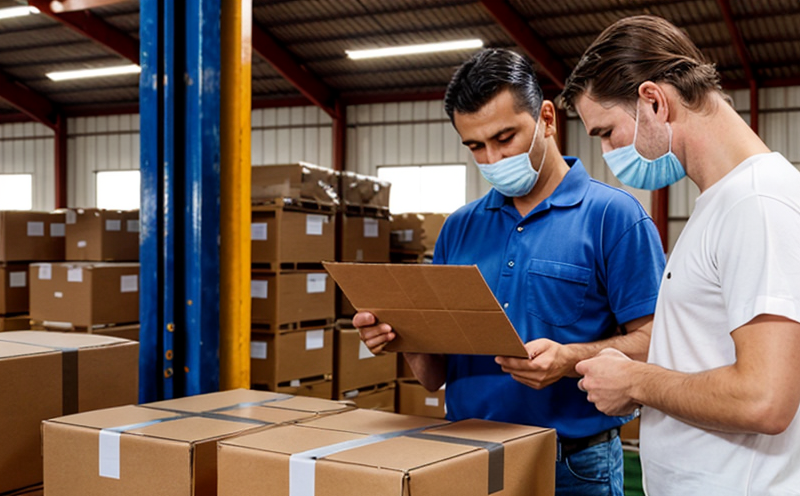Packaging quality inspection
The inspection of packaging is a critical component in ensuring product safety and compliance with regulatory standards. Packaging plays a pivotal role in protecting products during transportation and storage, thereby influencing the overall consumer experience and brand reputation. In industries such as pharmaceuticals, food & beverage, cosmetics, and electronics, the integrity of packaging can directly impact public health and safety.
Third-party laboratories specializing in this field provide comprehensive quality inspection services that cover a wide range of tests including dimensional accuracy, material strength, leak detection, seal integrity, and visual inspections. These tests ensure that each package meets the necessary specifications set by industry standards such as ISO 11607 for medical packaging or ASTM D2583 for flexible packaging.
Quality managers often face challenges in maintaining consistent product quality across different production batches due to variations in raw materials, manufacturing processes, and environmental factors. By outsourcing these inspections to expert laboratories, they can ensure that their products consistently meet the required standards. Compliance officers benefit from this service as it helps them stay compliant with local and international regulations.
R&D engineers also find value in using third-party labs for packaging quality inspection because it allows them to validate new designs before mass production begins. This not only reduces development costs but also minimizes potential recalls or product failures post-launch. Procurement teams can leverage this service when sourcing materials by verifying that suppliers deliver products that meet the specified quality criteria.
The importance of packaging integrity cannot be overstated, especially in sectors where contamination could lead to serious consequences. For instance, in pharmaceuticals, improperly sealed containers can allow moisture ingress which may affect drug stability and efficacy. Similarly, in food & beverage, compromised seals on cans or bottles might result in spoilage leading to significant financial losses.
Given the complexity involved with modern packaging solutions that incorporate multiple layers of materials like films, foams, and adhesives, it is essential for manufacturers to have reliable third-party inspection partners. These labs employ advanced technologies such as X-ray machines, electron microscopes, and laser scanners to examine even the smallest details within packages.
Moreover, these inspections are crucial not just from a safety perspective but also from an environmental standpoint. Properly designed packaging ensures efficient use of resources while minimizing waste throughout its lifecycle—from manufacturing through disposal. By adhering strictly to specified standards during inspection processes, manufacturers contribute positively towards sustainability goals.
Scope and Methodology
| Test Type | Description | Methodologies Used |
|---|---|---|
| Dimensional Accuracy | Ensures that packages meet specified size requirements. | Calipers, micrometers |
| Material Strength | Evaluates the robustness of packaging materials against external forces. | Tensile testers, compression machines |
| Leak Detection | Verifies that there are no leaks in containers or closures. | Air pressure testing systems, dye penetrant inspection |
| Seal Integrity | Checks the effectiveness of seals on packages to prevent contamination. | Water immersion tanks, ultrasound scanners |
| Visual Inspection | A subjective evaluation of packaging appearance for defects or inconsistencies. | Naked eye observation, magnifying glasses |
The scope and methodology employed by third-party laboratories ensure that every aspect of packaging is thoroughly examined. This includes both internal structures like cavities and external surfaces such as labels. By adhering strictly to internationally recognized standards, these labs guarantee accurate results that are reliable and repeatable.
Why Choose This Test
Selecting a reputable third-party laboratory for packaging quality inspection offers several advantages beyond mere compliance with regulations. Firstly, it provides an objective assessment of your products which can be invaluable during negotiations with clients or partners. Secondly, early identification of issues allows you to address them promptly thus avoiding costly reworks later on in the supply chain.
Thirdly, these inspections help maintain consistent quality across all production batches by providing real-time data that can inform process improvements. Lastly, it enhances your reputation as a responsible and forward-thinking business partner who prioritizes product safety and environmental impact.
Environmental and Sustainability Contributions
- Reduction of Waste: Properly designed packaging helps minimize waste by ensuring that materials are used efficiently during production.
- Resource Efficiency: By adhering strictly to specified standards, manufacturers contribute positively towards resource conservation efforts.
- Promotion of Recycling: Packaging that meets stringent quality inspection criteria can be more easily recycled at end-of-life stages.
- Increased Energy Efficiency: Efficiently designed packaging reduces the need for additional protective layers which ultimately leads to lower energy consumption during manufacturing processes.
These contributions align with broader sustainability goals aimed at reducing environmental footprints. Through rigorous quality inspections, manufacturers play a vital role in creating products that are not only safe but also sustainable throughout their lifecycles.





